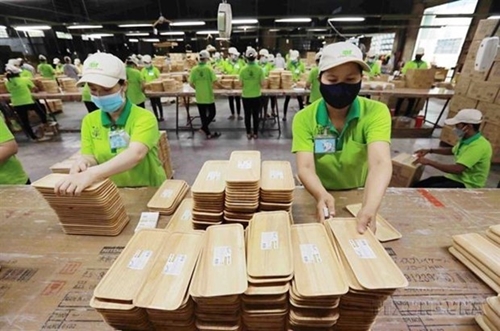The figure of the Swedish international trade center was cited by Nguyen Thi Hoang Thuy, Trade Counsellor at Vietnam’s Trade Office in Sweden and Northern Europe.
In 2022, bilateral trade stood at USD 1.617 billion, up 6.3% year on year. That consists of USD 1.264 billion in Vietnam’s exports to and USD 353 million in imports from Sweden, respectively increasing 5.4% and 9.9%, according to the General Department of Vietnam Customs.
Vietnam’s main exports to Sweden include telephones, computers, other electronic devices and components, textile - garment, footwear, steel products, and spare parts. Meanwhile, imports include telecommunications devices, machinery, equipment, and pharmaceuticals.
    |
 |
|
A wood product factory in Vietnam |
Last year was full of difficulties for the global economy due to prolonged impacts of many big changes like the Russia - Ukraine conflict, China’s zero-COVID policy, and the policy response to inflation in many countries, leading to decreased consumption demand and imports.
As a result, Vietnam witnessed a sharp fall in the shipments of many key products, and exports to Sweden also declined strongly in 2023. However, it still ranked second among the biggest Asian exporters to Sweden, after China, she added.
Thanks to the E.U. - Vietnam Free Trade Agreement (EVFTA), signed on June 30, 2019, and coming into force on August 1, 2020, trade opportunities between Vietnam and the E.U., including Sweden, are considerable, the official opined.
She perceived that the EVFTA has surely helped mitigate external adverse impacts on the Vietnamese economy, which can be seen in the competitive edge generated by preferential tariffs for Vietnamese goods in the Swedish market.
For example, Vietnam previously exported just over USD 100,000 worth of rice at the maximum to Sweden as it was unable to compete with Cambodian and Thai grain prices. However, rice shipments to this market have surpassed USD 3 million and are on the rise.
Besides, the FTA has not only brought about tariff benefits but also inspired Swedish firms’ interest in the Vietnamese market, especially when they are seeking new markets to shift investment and business activities to, she went on.
The Trade Counselor also pointed out many challenges to Vietnamese businesses in Sweden, including a small market, high requirements for goods, a lack of direct air routes, and the absence of seaport and airport partnerships. Vietnamese goods also have to comply with stringent regulations such as rules of origin, environmental standards, and technical criteria to enter the E.U. in general and Sweden in particular.
Once overcoming these difficulties, Vietnamese goods will gain a firm foothold in Sweden and the E.U., Thuy said.
She added her office is planning a number of activities to be held on the sidelines of coming high-level mutual visits such as a bilateral business forum, meetings with potential investors, and a Vietnamese goods week in Sweden. It will also arrange trips for Swedish companies to attend major events in Vietnam like a sourcing fair in June 2024 and an international food expo to further promote bilateral trade.
Source: VNA